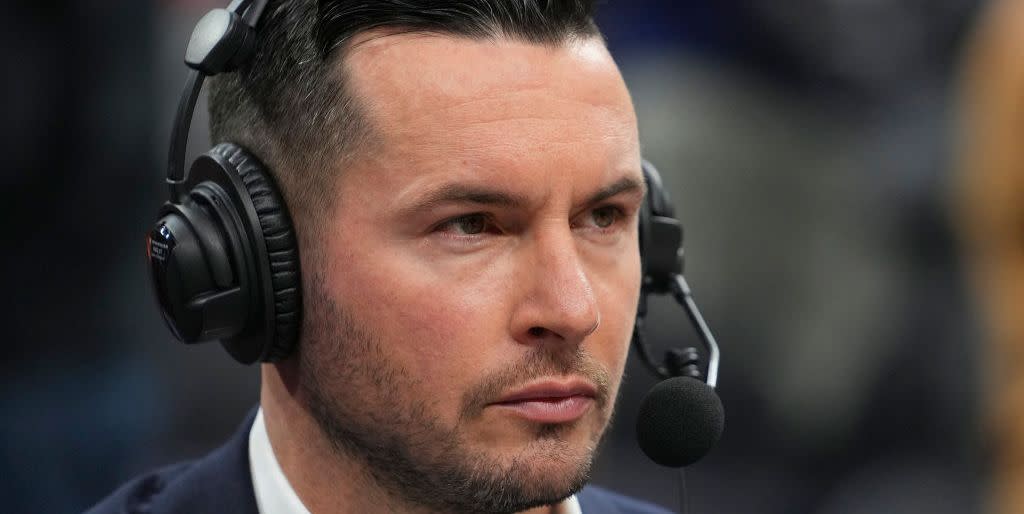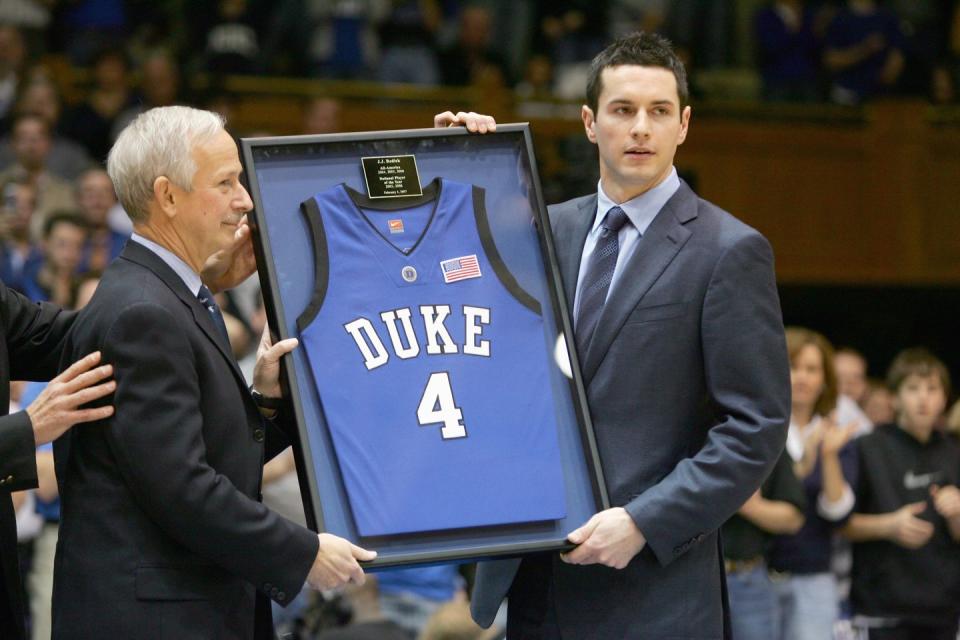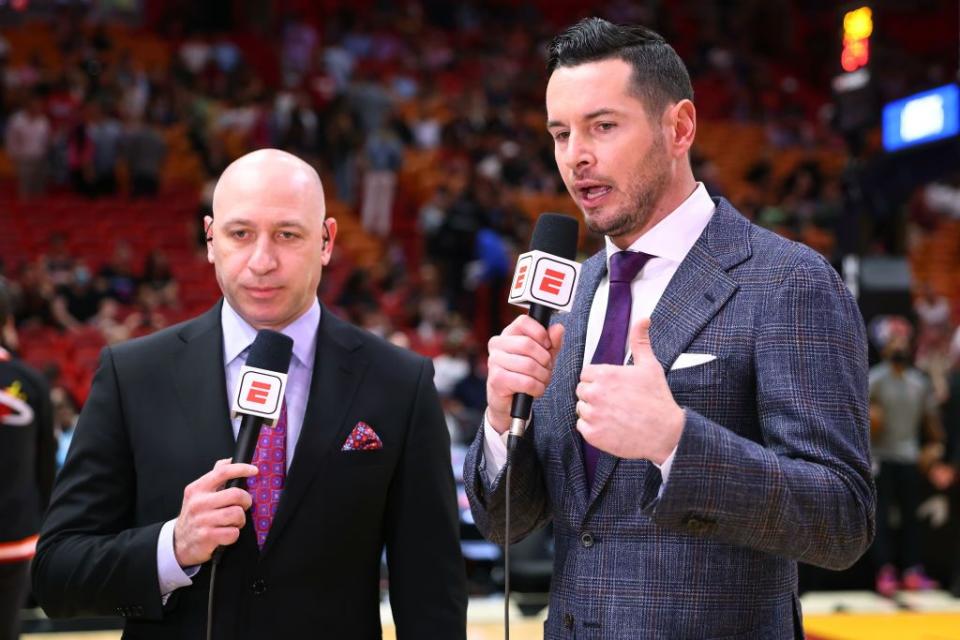JJ Redick is Putting the NBA Through Therapy, One Podcast At a Time

"Hearst Magazines and Yahoo may earn commission or revenue on some items through the links below."
The white kid who can shoot threes is rarely the most popular guy on the court—especially if you played for Duke. That’s just how it is. Even if you’re JJ Redick, arguably one of the greatest three-point shooters in college basketball history, you may still be remembered as the most hated athlete in college basketball over a decade later. And yet, the retired NBA star and ESPN First Take analyst has since become one of the most well-liked media figures in the NBA.
“When I was 18 or 19, I felt like everybody hated me,” Redick told me after a shoot for Draft Kings’ The Starting Five Live from The Compound video series. He just spoke on camera about the NBA's upcoming Christmas Day games and the state of the NBA for over an hour—but now it's time to check in on the man himself. “Because of therapy, mainly you just end up just being comfortable [with criticism],” he said. “But there's still people that hate me.” Even so, detractors may be few and far between. On his uber-popular podcast, The Old Man and the Three, Redick has interviewed Stephen Curry, Hasan Minhaj, Sue Bird, and even his bombastic First Take buddy Stephen A. Smith, just to name a few. But Redick doesn’t want to let the reversed media narrative about him get to his head. "An inflated sense of self,” as he puts it, may be just as bad.
Of course, no one is the same person as they were in college, and Redick’s experiences clearly benefitted him when you listen to The Old Man and the Three. It’s here, despite all the media avenues available to athletes in the NBA, where players feel the most human. Even with all the egos in the league, they come to Redick to talk through their struggles— maintaining a positive mindset in the face of loss, forming a routine to keep up with demanding travel schedules, and the nerve-racking experience of not knowing what city you’re going to live in before you’re traded.
Maybe it’s easy to express yourself when you know the person in front of you was once the most hated kid in basketball. Hell, maybe JJ is transforming how the NBA media cycle works because of how unnecessarily awful it was to him. Either way, The Old Man and the Three delivers some of the most authentic and engaging conversations in sports today. To Redick, his guests, and us, at home? It feels something like therapy.
ESQUIRE: How's it going, JJ? I know you're doing a lot of talking today.
JJ REDICK: Good. Sometimes I get sick of hearing my voice.
You’ve talked a lot about your experience in therapy, and I feel like mental health is a big topic on your podcast as well. You get players to talk about forming a routine and getting their mental health straight.
It's weird because, especially with older players, DeMar [DeRozan] is a great example—or the Joakim Noah episode. I get done with those episodes and I felt like I did a session of therapy. The player feels that way, too. We talk about it off camera. But I think that's the goal of the podcast. To pull back the curtain, give you an inside perspective on players' lives and different moments from their careers. But it's really about storytelling and humanizing these athletes that are revered by so many people.
Do you ever find it hard to talk to guys who were your friends when you were active in the league, or guys you played against who were your rivals?
No, and the reason I say that is because the friends we've had on the show—so Ben Simmons, Jrue Holiday, Joel [Embiid], CP [Chris Paul]—they're guys that I played with that I have a great relationship with. That's very easy. The guys I don't necessarily know that well, the reason I'm having them on the show is because I respect the shit out of them and I'm a fan of them. And I wouldn't have somebody on if I was like, "I fucking hate this guy."

Obviously, this is something you're used to talking about now—but do you find it hard to talk to guests on the podcast about losing, or about learning from a loss?
No, because for the most part, I think when we have a guest on, whether I know them or not, I have a general sense of how they're wired. And I used the term “sicko” with Draymond and CP last January. It was the first time I conceptualized this term of a sicko. And there are times where halfway through an interview with someone that I don't know, I realize that person is a sicko. And that's when I realized we can go to some dark places and they're comfortable doing that. And those are the really fun interviews for me.
As someone who played over 15 years in the league—and even reached the finals—but never walked away with a championship title, how would you define what a successful career in the NBA looks like?
Every player probably wants to be an All-Star. Every player wants to win a championship. Every player wants to make a lot of money. And if those are the only markers of what a successful career is, then truthfully, there's very few players that have played in the NBA that have had a successful career. And I disagree with that. I think what a successful career is, is someone who maximizes their talent. I would've never guessed I would've played 15 years, played deep in the playoffs multiple times, scored the amount of points I scored, started games for eight years. And so, I feel like I maximized my career. Did I end up short of some of that other stuff? Yeah, I would love to have been an All-Star. More importantly, I would've loved to have won a championship. It's something that I still am bitter about in some ways—that I didn't win at Duke. I will be bitter 30 years from now that I didn't get to experience a championship. I've talked with my therapist about this and no matter how he frames it, I'm like, "Paul, you're wrong. I'm going to be mad forever."
You can play 15 years in the league, and you only get so many opportunities to actually be a championship team. It's not a given. I remember losing the Finals… watching the Lakers celebrate. And I was like, "I'm going to just burn this into my memory because we're going to get back here next year." I never got back to the Finals. I thought we would be back. I didn't know that that was an opportunity lost. I didn't realize that at the time. And that's part of the bitterness. That's part of the anger. I didn't realize I was angry until two months ago. I loved my career. I loved every moment of it... And it wasn't until two months ago, I was literally in a hot Vinyasa flow class, and we got to the end and I'm sitting there and I just got so emotional. And I was like, "Dude, you've got some anger man. You've got some anger."
The news broke the other week that you turned down a potential coaching gig next to the new Boston Celtics interim head coach, Joe Mazzulla. Have you never thought about trying to reclaim that success, but from the coaching side?
It's funny because I had a lot of coaches throughout my career tell me I would coach when I was done. Or they would try to. Rick [Carlisle] was like this in Dallas. He was like, "You should coach. You would love it." I was there two half months, and I spent a ton of time with Rick. He was so good to me. Doc [Rivers] would always tell me that. I'm like, "Doc, there's no fucking way I'm gonna coach." And then, last spring, I just started thinking: Maybe I do want to coach. I always thought if I did something in basketball, it would be front office because I like the intellectual component of that. And I like the idea of not only managing people, but other people managing me. The collaboration component of a front office.
But there's something about being in the action. And I think it probably started around the time I started calling games. Because you're back. You're a part of the experience. You're a part of the game. For me, that was probably the trigger point. Then I got randomly four unsolicited, "Do you want to coach? Do you want to join the staff?" [messages] from different teams. And truthfully, I considered two of them. Not just the Celtics—sorry, I considered another one. I just didn't feel like the timing was right. Maybe the timing will never be right. And maybe the media stuff ends up being a 20-to-30-year thing. I just know that what I'm doing right now feels like the right thing.
When did that feeling click for you? When you started thinking, "Oh, I think this is working?"
The podcast felt very, it sounds bad to say this, but it felt like a burden when I was playing just because I had so much of my time and energy and focus invested in training and working and sleeping and eating right. And it wasn't until I retired that I realized how much I really enjoyed doing the podcast. And then our stuff with DraftKings now, I absolutely love doing as well. They've been awesome to work with. So, it's like, I have these three components of my life right now. It all feels like it fits together and that feels right to me.

What do you hope people take away when they listen to The Old Man and the Three?
Insight. I have accepted the fact that whether it's First Take, or a game, or a podcast, there will be people that disagree with what I said or have a differing opinion. And that's fine. But I think for someone who wants legitimate insight, a component of education, hopefully a component of humor as well, [they'll find it in The Old Man and the Three.] Even in calling a game, there's maybe something that I see that the viewer doesn't see. That's insight. And that's the goal, really.
I know your kids are old enough now to see you on TV and recognize you. What's that like? Especially as they're getting into basketball.
I mean, I didn't think they had a firm grasp of what I did. They knew I played basketball. They didn't really get it until I retired. Then they got super into basketball and started collecting trading cards and watching YouTube highlights.
Is he watching JJ highlights?
He pulls them up. Occasionally, it sucks for me because it brings back some—I don't know if PTSD is the right word—but it brings back bad memories. He likes watching highlight montages, so it'll be the worst referee calls of the 2010s. Or he will watch buzzer beaters. And for some reason, every fucking time he's watching the buzzer beater montage highlight video, I walk in at the exact moment Kawhi Leonard beats us when I was with Philly and he was in Toronto. I'm like, "How does this always happen? Are you putting this on repeat?
Now, my eight-year-old plays six days a week on two different teams. And he's just in love. It's cool to see as a dad. He’s on an AAU-type team, even though he's eight, that I'm coaching, by the way. Yhen he does this Rec League in the city every Tuesday. Last night was their last game of the season. They lost in sudden-death overtime. He played like a champion. He had to guard the other team's best player. And he was just emotionally drained. He got really emotional after losing. And I'm like, "I'm glad that losing matters to you." Then he's upset because they don't have any games for three weeks. The kid just wants to play and compete. And as a dad, it's like, nah. That's the coolest thing ever.
You Might Also Like
